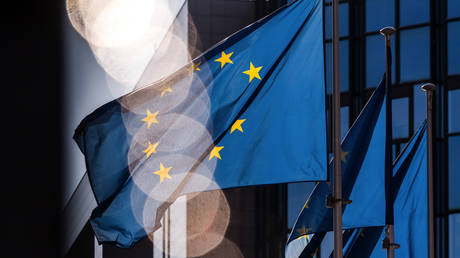
Only a few years after it raised objections over Iran, Brussels is waving the white flag at Uncle Sam
The European Union once fancied itself as an independent center of global power, with a currency to rival the dollar. However, it’s now on the verge of handing over the last vestiges of its financial independence to American control.
What is known as Council Regulation 2022/1905, adopted on October 6, 2022 as part of its eighth sanctions package, marked a new stage in the bloc’s sanctions policy. Article 1 of the document expands the number of criteria by which blocking sanctions may be applied with regard to the conflict in Ukraine. Now included are individuals and legal entities that contribute to bypassing the embargoes against Russia under the Ukraine package. The new legal mechanism suggests that the EU is adopting secondary sanctions similar to those long used by the US.
The essence of these is that financial restrictions are applied for interactions with blocked persons or entities. That means any financial transaction with those listed risks landing the initiator of such a deal into the same category. However, the new rule does not specify who is included. This gives reason to believe that it can be applied extraterritorially, that is, outside the EU and against persons and entities from third countries.
There is no concept of extraterritoriality or secondary sanctions in Regulation 2022/1905 itself. Strictly speaking, the already existing criteria for being included can also apply globally by default. For example, even before the release of the eighth package, those found to be “contributing to the destabilization of Ukraine or benefiting from interaction with the Russian authorities” could have been targeted.
The regulation does not indicate that these persons must necessarily be Russians or Ukrainians. Thus, theoretically, this could apply to anyone. However, the old set of criteria was still linked to Moscow or the situation in Ukraine. The new criterion expands the range of persons who may fall victim. However, the notion of bypassing sanctions is not precisely defined. It can be understood as a transaction with a person already on the list. In practice, however, this means that foreign counterparts from countries that have not joined the EU sanctions (countries not included in the list of states unfriendly to Russia) risk being blocked.
It should be noted that this practice has long been used by the US. Businesses from countries friendly to Russia are generally frightened by the threat of secondary sanctions. The US Department of the Treasury’s recent threat to apply them to transactions with the Russian Mir payment system, which cited a long-standing regulation pursuant to an executive order of the president of the US, led to a widespread suspension of cooperation by a number of banks in friendly countries. The emergence of a legal mechanism for secondary sanctions within the EU will only add to the concerns businesses have. The big question is how exactly this will be implemented. However, when it comes to Russia, it is obvious that Brussels will seek to concentrate in its hands more effective tools for punishing those who circumvent its penalties.
Another new feature of the eighth package that can be considered a form of secondary sanctions is a restriction on the transport by sea of Russian oil if the price of the contract for its purchase exceeds the so-called EU “price ceiling.” According to Council Regulation 2022/1904, for such oil being transported by ship from a third country, providing technical, financial, insurance, and other services to the vessel in question will be prohibited. In reality, this may lead to those from friendly countries that violate Brussels’ requirements not being serviced, for example, in the bloc’s ports. They may also not be insured by EU companies or receive funding from individuals or entities.
Again, the new guideline has not yet been elucidated and it is not clear how it will be applied. However, the legal basis has already been established. Of course, it will take some time to evaluate the effectiveness of the new EU sanctions instrument. But its introduction was accompanied by political statements. For example, French President Emmanuel Macron called on his Turkish counterpart to join in and not contribute to the circumvention of already-imposed EU restrictions.
Interestingly, the bloc has previously been critical of the American practice of employing secondary sanctions. A cold shower for the Western Europeans, for example, was the US’ unilateral withdrawal from the nuclear deal with Iran in 2018. Washington reinstated its sanctions, while the EU did not. However, businesses from EU countries were forced to comply with US law and leave Iran, fearing the same secondary blows. This proved an irritation for Brussels.
There has also been concern about the breadth of the American interpretation of the boundaries of its jurisdiction. Dozens of European companies have been hit with heavy fines from the US Treasury. The most painful blow has fallen on banks, which have paid penalties in excess of $5 billion over the past decade. Accordingly, secondary sanctions were taken seriously by Brussels as a problem.
In November 2020, the report of the EU Directorate General on foreign policy was published. In order to increase the effectiveness of EU sanctions and respond to the extraterritorial effect of foreign restrictions (read, the US), it was proposed to create a coordinating body called the EU Agency for Foreign Assets Control (EU-AFAC). EU-AFAC was supposed to develop common standards, tools, and certification mechanisms in order to increase the confidence of European businesses engaged in legitimate trade and investment. This could have helped European companies avoid secondary sanctions against them. However, the idea never made it beyond slogans and the agency never ended up being created.
In January 2021, the European Commission adopted a strategy to enhance the openness, strength, and resilience of the EU’s economic and financial system. The purpose of the strategy was to promote financial and economic cooperation with countries outside the bloc, including in connection with the application of extraterritorial sanctions. The Commission, in cooperation with the European Central Bank and EU supervisory authorities, was supposed to interact with financial market infrastructure organizations to conduct a thorough analysis of their vulnerability in the event of the illegal extraterritorial application of unilateral restrictions by third countries, followed by the adoption of the necessary measures to eliminate such a vulnerability.
The European Commission then announced its intention to strengthen the Blocking Statute, which declares all foreign extraterritorial sanctions null and void in the EU and provides the power of courts in the jurisdiction of the bloc to satisfy the claims of EU citizens and companies affected by such restrictions.
There was an intention to clarify the procedures for applying Article 6 of the Blocking Statute (allowing persons subject to the regulation to recover in court the damages incurred as a result of extraterritorial measures), and to strengthen measures to counteract the recognition and enforcement of foreign judgments and rulings involving extraterritorial measures (Article 4). It should be noted that the EU already tried to apply the Blocking Statute in 2018, after Washington’s withdrawal from the Iranian nuclear deal, in order to get European businesses out of US sanctions against Iran. However, it turned out that the EU’s financial and economic dependence on the US was too great for these actions to have a real effect.
In dealings with Iran, the EU tried to create a special payment mechanism (INSTEX) independent of the US, which also did not work. However, a similar mechanism (SHTA) was successfully launched by Switzerland, but this was because the relevant US authorities were involved in its creation.
The assessments of the EU authorities also coincided with the opinions of some experts. According to Patrick Terry, professor at the German University of Public Administration in Kehl, “the US assertion of extraterritorial jurisdiction is not supported by any of the principles of jurisdiction recognized in customary international law, which prohibits interference in the internal affairs of other states.” Hans Köchler of the Austrian University of Innsbruck made similar assessments, insisting that unilateral sanctions, especially if applied extraterritorially, are a violation of national sovereignty. Steven Blockmans of the Centre for European Policy Studies (Belgium) prepared an overview report on US secondary sanctions, the possible use of such measures by China, and measures that the EU could use to meet new challenges.
Now the EU itself is creating a mechanism for secondary sanctions against Russia. However, the use of such an instrument is unlikely to protect companies in the bloc from secondary US sanctions.
In the context of Euro-Atlantic solidarity in opposing Russia, the issue of EU financial sovereignty in relations with the United States is likely to fade into oblivion.




